Canadians want a National Self-Care Strategy to help protect the public healthcare system
January 25, 2021
Cliquez ici pour la version en français
KEY FINDINGS
1. Healthcare is a top issue for most Canadians as many are dissatisfied with emergency room wait times and access to family doctors.
2. Canada’s ageing population, government deficits and debt, and the COVID-19 pandemic are seen as threats to health services across the country.
3. Self-care is widely seen as a tool to strengthen and sustain the public healthcare system and reduce costs within the system.
4. There is broad, national, cross-partisan support for a National Self-Care Strategy, developed and supported by the federal government.
—
Watch the episodes of inFocus with David Coletto focused on self-care and the future of healthcare in Canada
—
COVID-19 puts a bright spotlight on our own health and lifestyles as well as on the healthcare system. For the past ten months, Canadians were asked to make the right choices to protect themselves, their families, and their communities from the risk of the coronavirus.
But even before the global pandemic, the idea that people want to, and can, take better care of themselves was spreading. Thanks to increased access to health information, a broader range of health professionals, and a growing selection of consumer health products, Canadians have never had the tools and information to take better care of themselves.
At the end of 2020, Abacus Data conducted a national public opinion survey commissioned by Food, Health, and Consumer Products of Canada, the national association representing the country’s food, beverage, health, and consumer product manufacturers, to explore public perceptions about the health system, attitudes towards the concept of self-care, and the desire for a national self-care strategy.
Here is what we found:
HEALTHCARE IS A TOP ISSUE FOR MOST AS MANY ARE DISSATISFIED WITH ACCESS AND CAPACITY AS HEALTH CARE COSTS SOAR.
Over six in ten Canadians rank healthcare as a top issue with 31% selecting it as the top issue from a list of ten. Those over 45, women and those in Quebec are more likely to rank it as a top issue. Politically, Liberal, Conservative and NDP supporters all rank it as their top issue.
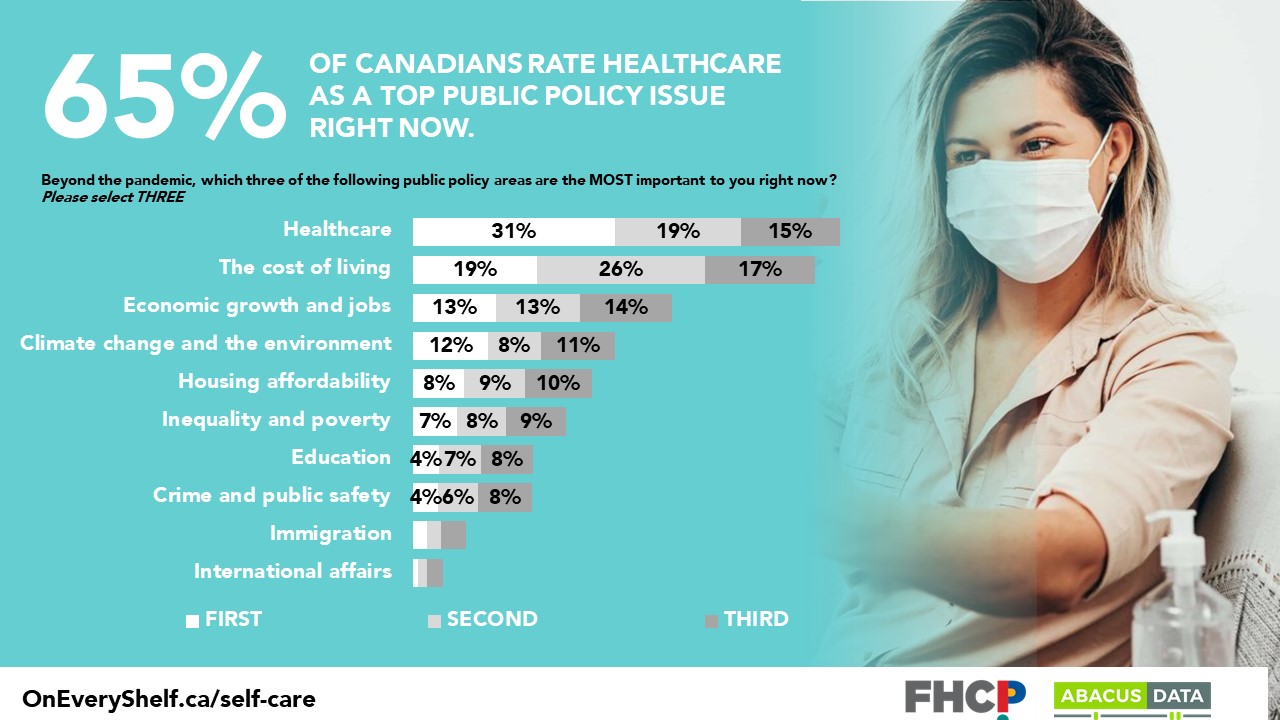
Emergency room wait times and family doctor availability are the two areas of the healthcare system in which a majority rate as unacceptable or terrible. There’s also wide dissatisfaction with the consistency of healthcare across the country and the overall capacity of the system. Most feel the amount and quality of information people have to make good decisions about their health is acceptable, but there is room for improvement even here.
THREATS TO PUBLIC HEALTH CARE: AGING POPULATION, DEFICITS & A PANDEMIC
Canadians understand there are forces at work that threaten the healthcare system they rely on. Most Canadians recognize that the COVID-19 pandemic, Canada’s ageing population, and government deficits and debts are all threats that can weaken healthcare services.

Moreover, 77% of Canadians believe that government spending on healthcare will have to increase over the next 10 years, putting further strain on government budgets which could threaten the health system’s sustainability.
OPPORTUNITIES TO IMPROVE PUBLIC HEALTHCARE: SCIENCE, TECHNOLOGY AND VIRTUAL CARE
At the same time, most Canadians believe that scientific innovation in diagnosis and treatment, digital technology and information sharing, and virtual care are all forces that can improve healthcare services. Having lived through an extended period where technology has made life more convenient, Canadians recognize these forces can also improve the healthcare system.

HOW CAN WE CONTROL THE COSTS OF PUBLICLY-FUNDED HEALTHCARE?
• 91% support ensuring that Canadians are well-informed about health and wellness matters and have access to the best information possible.
• 86% support creating more incentives for Canadians to live healthier lives by eating better and exercising more.
• 84% support efforts to support Canadians’ ability to take care of themselves to reduce unnecessary trips to hospitals, clinics, or family doctors.
• 83% support expanding the role of different health professionals in the system, like nurses, pharmacists, and paramedics.
• 75% support ensuring Canadians have access to all the same innovative, non-prescription medicines and natural health products as those in the United States or Europe.
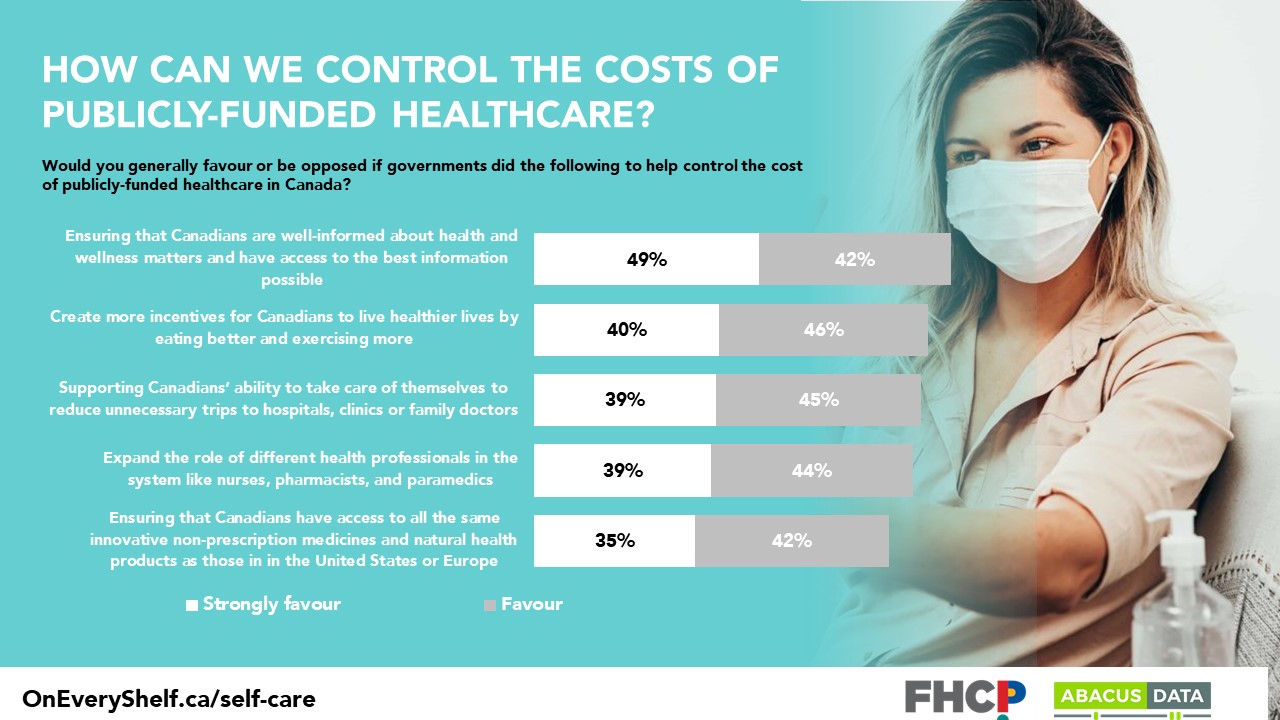
These views are consistent across demographic, regional, and political groups.
SELF-CARE IS RECOGNIZED AS A TOOL TO STRENGTHEN THE PUBLICLY-FUNDED HEALTHCARE SYSTEM.
Almost all Canadians (95%) agree that “Canadians need more tools to care for themselves and a strong, resilient publicly-funded healthcare system there for when they can’t.”
This view is shared widely across regional, demographic, and political groups, with the overwhelming majority of Liberal, Conservative, NDP, Green, and BQ supporters agree with the idea.
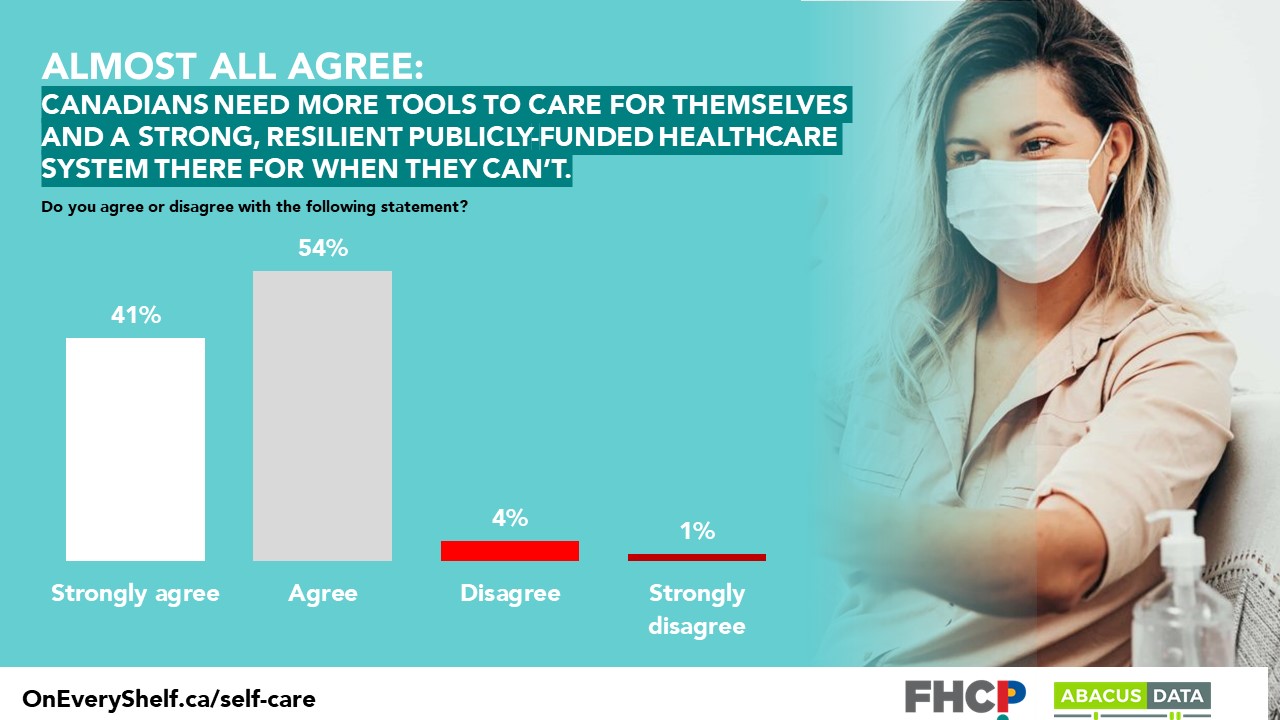
A CONSENSUS: SELF-CARE IS A GOOD IDEA
Respondents were shown the statement below and asked whether the idea was a good or bad idea.
“Self-care lets people take better care of themselves. Self-care encompasses everything from making healthy lifestyle choices to treating minor health ailments to preventing and managing chronic diseases. It requires that people have access to good information and the tools to take care of themselves.”
Overall, 96% felt the idea presented was a good idea, with 44% feeling it was a very good idea. Reaction to the self-care concept was widely embraced, especially among younger Canadians, women, and those who support the major political parties. In fact, there was near cross-partisan consensus on the concept of self-care.
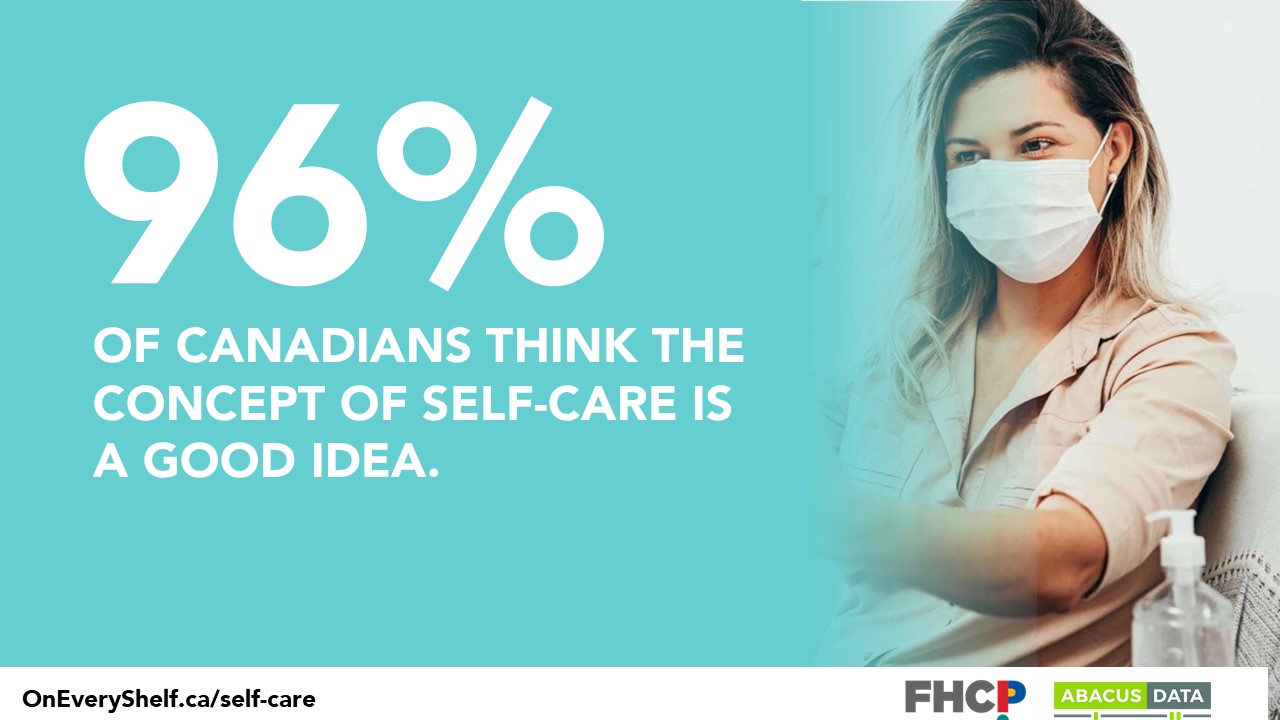
CANADIANS WANT A NATIONAL SELF-CARE STRATEGY
Given the broad support for self-care, it is not surprising that 87% of Canadians think it is a good idea for the federal government to develop a National Self-Care Strategy, proposed by Food, Health, and Consumer Products of Canada. Only 5% have a negative reaction to the proposal while 8% are unsure.
The idea of a National Self-Care Strategy finds wide support across the country and political spectrum. Large majorities in every region of the country, across all age groups (especially those under 30 and over 60), and among men and women. Liberal supporters are the most enthusiastic about the idea, but Conservative and NDP supporters overwhelmingly feel developing a national strategy is a good thing.
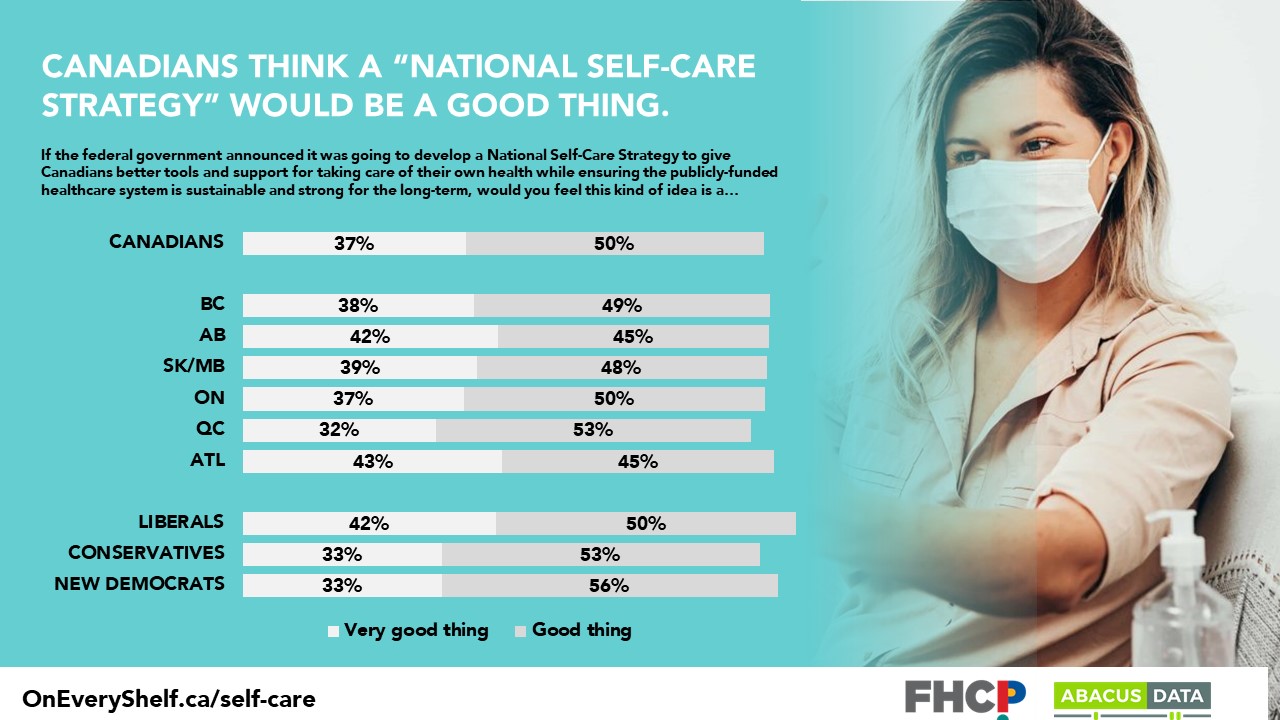
BROAD SUPPORT FOR PROPOSED COMPONENTS OF A NATIONAL SELF-CARE STRATEGY
The survey also asked respondents to respond to several aspects that FHCP wishes to see included in a National Self-Care Strategy. In all cases, a majority said they would like to see the actions happen.
• 82% like “improving health literacy so Canadians can make better decisions about their health and improve their ability to care for themselves.”
• 81% like “removing the GST on non-prescription medications, thereby lowering their cost for consumers.”
• 75% like “allowing Canadians to claim non-prescription medications they regularly use to manage their health for the Medical Expense Tax Credit.”
• 60% like “removing unnecessary barriers to switching medications from prescription to non-prescription or over the counter status.”
• 57% like “changing regulations to ensure that companies that make non-prescription or over the counter medications and natural health products can more easily introduce new products available in other countries into Canada.”

UPSHOT
Healthcare is the top issue in Canada right now. The COVID-19 pandemic has put a spotlight on our health and the capacity of our healthcare system. But prioritizing healthcare is not a recent trend. For years, Canadians have consistently put improving the healthcare system at the top of their agenda.
Budget deficits, an ageing population, and a global pandemic raise doubts about the sustainability of the healthcare system. But technology, scientific innovation, and increased access to virtual care give Canadians hope that there can be improvements to the system.
The desire to see a robust, resilient and sustainable healthcare system is a priority for almost all Canadians.
A National Self-Care Strategy that aligns efforts across the country empowers Canadians to make better decisions while giving them access to affordable, high-quality products is widely supported.
Improving the healthcare system does not divide Canadians like other issues. There’s a broad consensus that governments, both federal and provincial, will face immense fiscal challenges in the years to come. The public sees a National Self-Care Strategy as a tool to strengthen the publicly-funded healthcare system they rely on and value while providing them with the tools and products they need to take care of themselves when they can.
There is a lot of upside with little political risk in starting a national conversation of the merits of self-care, especially when framed around a collective effort to improve health outcomes, prevent chronic illness and disease, and strengthen the healthcare system that is a core element of Canadian identity. This is an area where the federal government can play a leadership role while working collectively with provinces.
Interested in a deeper dive on this data and hear from experts about how a National Self-Care Strategy would work? Register today for inFocus with David Coletto, a digital event being supported by FHCP on February 3 at 1pm ET.
And don’t miss any of our research and analysis, plus get our weekly Worth A Look newsletter. Sign up today.
ABOUT ABACUS DATA
We are the only research and strategy firm that helps organizations respond to the disruptive risks and opportunities in a world where demographics and technology are changing more quickly than ever.
Find out more about what we are doing to help clients respond to the COVID-19 pandemic.
We are an innovative, fast-growing public opinion and marketing research consultancy. We use the latest technology, sound science, and deep experience to generate top-flight research-based advice to our clients. We offer global research capacity with a strong focus on customer service, attention to detail and exceptional value.
We were one of the most accurate pollsters conducting research during the 2019 Canadian Election.

Contact us with any questions.
Find out more about how we can help your organization by downloading our corporate profile and service offering.
METHODOLOGY
Our survey was conducted online with 2,000 Canadians aged 18 and over from December 27, 2020, to January 1, 2021. A random sample of panellists was invited to complete the survey from a set of partner panels based on the Lucid exchange platform. These partners are double opt-in survey panels, blended to manage out potential skews in the data from a single source.
The margin of error for a comparable probability-based random sample of the same size is +/- 2.2%, 19 times out of 20. The data were weighted according to census data to ensure that the sample matched Canada’s population according to age, gender, educational attainment, and region. Totals may not add up to 100 due to rounding.
This poll was conducted by Abacus Data and paid for by Food, Health, and Consumer Products of Canada.



